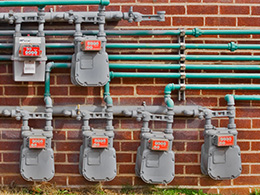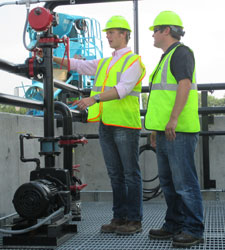October 2025
Inside the Newsletter:
Welcome Claire | Boiler Control Optimization | MnTAP Internships’ | Events | Funding Opportunities
Meet Our New Engineer, Claire Hartwig Alberg!
We are pleased to announce that Claire joined MnTAP in July 2025. Claire’s main responsibility at MnTAP is to reduce per- and polyfluoroalkyl substances (PFAS) and support businesses in preparing for Minnesota’s upcoming ban. Recently, we caught up with Claire for a short Q&A. Read on to learn more about how Claire became interested in working on environmental issues, how she plans to contribute to and enrich our MnTAP team, and what she does for fun outside of work.
What made you decide to pursue a career in your field?
I majored in physics, which is a very broad subject with a ton of applications, in my undergraduate degree, but the two career paths I was most interested in became environmental engineering and aerospace engineering. Within the four years that I spent in undergrad, it became clear to me that I could make the most meaningful impact in the environmental sector. The interdisciplinary nature of environmental engineering and its potential to improve the well-being of people and the environment were also really appealing to me.
What roles did you have before joining MnTAP? What skills or expertise are you most excited to bring to MnTAP from those past roles?
I’ve had pretty varied experiences for someone who is still in the early years of their career, and I truly feel I’m better for it! After getting my Master of Science in environmental engineering and carrying out research on microplastics at the University of Minnesota Twin Cities, I jumped right into environmental consulting. There I gained a working knowledge on the remediation of emerging contaminants and got to know some great people.
After a few years in consulting, where I was largely subcontracting for projects with the Minnesota Pollution Control Agency (MPCA), I decided that I wanted to see what the state service side of things looked like. I then worked in a pretty niche position at the Minnesota Department of Agriculture (MDA) as a research scientist where I helped to author two legislative reports on the presence of PFAS in pesticide products and to implement Minnesota’s recently passed PFAS ban. While on that team of very talented scientists at MDA, I learned a lot about state work and got to experience being on the regulatory side of things. Through writing legislative reports, I also learned a lot about writing on highly technical subjects in an accessible way.
Ultimately what I am most excited to bring to MnTAP is my experience in the world of emerging contaminants along with the tips and tricks I’ve learned in making somewhat scary and complicated subjects more approachable.
Can you tell me a little about your new role at MnTAP, and what you will be working on?
My new role at MnTAP is largely going to be focusing on PFAS source identification and reduction. With my role, the main objective is to work with businesses to determine how and where in their manufacturing processes PFAS may be used and see if there are alternative materials or processes that might be employed.
What motivated you to join MnTAP?
The aspect of pollution prevention is really what drew me to MnTAP. As someone who has worked in PFAS remediation, I know how hard and expensive it is to remove these chemicals from the environment once they have been used and disposed of. In regard to PFAS pollution, I truly believe the biggest difference that can be made right now is reducing contamination at its source.
What is one thing about you that might surprise people?
In addition to being pretty good at math (usually), I am also pretty good at singing and playing the violin!
Claire strengthens our team as we work to improve our services in supporting Minnesota businesses that are aiming to achieve full compliance with the state’s upcoming PFAS ban. Please join us in extending a warm welcome to Claire!
Author
Jocelyn Leung
Communications Specialist
Boiler Control Optimizations to Improve Air Quality
 MnTAP and the Center for Energy and the Environment (CEE) continue to offer no-cost boiler control optimizations to facilities to improve air quality in Minnesota. This project will reduce particulate matter equal to or less than 2.5 microns (PM2.5) and nitrogen oxides (NOx) emitted by burning less fuel through increased boiler efficiency. In addition, the facilities will save money on their heating bills.
MnTAP and the Center for Energy and the Environment (CEE) continue to offer no-cost boiler control optimizations to facilities to improve air quality in Minnesota. This project will reduce particulate matter equal to or less than 2.5 microns (PM2.5) and nitrogen oxides (NOx) emitted by burning less fuel through increased boiler efficiency. In addition, the facilities will save money on their heating bills.
PM2.5 is linked to an increased risk of heart attacks, asthma attacks, and acute and chronic bronchitis. NOx is a precursor of ozone, which can make asthma and bronchitis worse. Air pollution is estimated to play a role in 10% of all deaths in 2015 in the Twin Cities metro area and according to the Life and Breath Metro 2022 Report, “the highest estimated rates of air pollution-related death and disease are found in neighborhoods with the largest percentage of Black, Indigenous and People of Color (BIPOC), low-income and uninsured residents, and people who live with a disability.” PM2.5 was estimated to contribute to almost 9% of deaths in 2015 in three Greater Minnesota cities according to the Life and Breath: Greater Minnesota 2022 report.
Eligible organizations include but are not limited to businesses, multifamily buildings, places of worship, or schools. Other requirements for participation include:
- Having hot water boilers and not steam boilers.
- Having boilers used for space heating only and not for industrial processes. There may be some situations where boilers that also provide domestic hot water will be eligible.
- Being in or near an environmental justice area. The Minnesota Pollution Control Agency (MPCA) provides a map which can be used to identify eligible areas.
We are working on a grant amendment that may expand the service area and extend the project timeline until January 2027.
MnTAP and CEE will provide boiler control optimizations to at least 20 organizations. In addition, this project will develop and share a toolkit and training on the boiler control optimization process to allow these activities to be replicated in other communities.
This project is a partnership between MnTAP, the MPCA, CEE, and the Lake Street Council. Funding for this project comes from a U.S. Environmental Protection Agency (EPA) Pollution Prevention Grant: Environmental Justice in Communities.
Contact:
Laura Sevcik
lsevcik@umn.edu
612-624-8192
The 2026 MnTAP Intern Program Host-Site Proposal Form is Live! Plus 4 FAQs Answered
 It’s hard to believe that another MnTAP Intern Program summer is in the books! We’re excited to report on the collective results from the work of our 2025 MnTAP Intern Cohort when we publish MnTAP Solutions this fall.
It’s hard to believe that another MnTAP Intern Program summer is in the books! We’re excited to report on the collective results from the work of our 2025 MnTAP Intern Cohort when we publish MnTAP Solutions this fall.
With the close of the 2025 program, we are now seeking host-sites for the summer of 2026. Are you interested in pursuing projects that can reduce waste, prevent pollution, and/or reduce water or energy use in your facility? If so, do not wait! Our proposal form is live, and we’re excited to meet with candidate sites to discuss potential projects.
How to submit a project proposal:
Submitting a proposal form on our MnTAP website for the MnTAP Intern Program is much easier than you might think. Though you can view all sections of the proposal form on one page, here is a short summary of what you’ll need to provide:
- Basic facility info: This includes physical location, primary contact information, and primary products and/or services.
- Proposed project info: This entails a brief description of your proposed 3-month intern project; what categories (e.g., waste, pollution prevention, or water and/or energy conservation) you want to focus on; and any applicable or available goals you have.
- (Optional) Facility resource consumption data: This is not mandatory but can be very helpful for our staff to judge the scale of your project.
- Willingness to cost-share: MnTAP asks for a contribution of $4,000 for from each host site for participating in the program. You can request more information on this payment when submitting your proposal.
To make things even easier – if you’re unsure of any elements of your proposal and/or need some help exploring details, this is no problem at all and quite common. A MnTAP technical staff member can connect with you and assist with further refinement of these details either before or after your proposal submission.
Submitting a proposal sooner than later has the following benefits: 1) it leaves enough time to refine details; and 2) it ensures that MnTAP staff can visit your site to scope your potential project.
Four Frequently Asked Questions from sites considering a MnTAP Intern Proposal:
Q. How much time and/or effort is required to serve as a host site supervisor?
A. Though each intern project is different, an on-site supervisor can expect to budget between 2 to 5 hours per week. This typically entails meeting with the intern, answering their questions, and facilitating connections with other staff and project resources. Interns may need a bit more support early on in their project but can hit their stride and work independently once they become more familiar with the facility and project goals.
Q. Is my company/organization obligated to implement the recommendations provided by the intern?
A. Though we sincerely hope that you take the intern’s work and recommendations into consideration, there is no contractual obligation to implement proposed solutions.
Q. What role does my company/organization play in the hiring process?
A. MnTAP handles the recruitment, interview, and selection process for all interns assigned to host sites accepted into the program. Our team is well trained to take your site and project’s needs into consideration when making our final selection. You will have an opportunity to meet the candidate before they start at your facility during a scheduled candidate Confirmation Meeting.
Q. What is my company/organization getting by contributing $4,000 for a summer intern?
A. 500 hours of project work from a MnTAP intern, co-supervisory support from a MnTAP engineer or scientist, a confidential final report with detailed recommendations, a feature in the MnTAP Solutions publication in print and PDF form, and 2-years of follow-up support from MnTAP staff.
Contact:
Matt Domski – Intern Program Manager
mdomski@umn.edu
612-624-5119
Events
Smart Salting: Parking lots and sidewalks certification training
MPCA
November 19, 2025, 8:00AM – 1:30PM
Location: Forest Lake City Center, 1408 Lake St. S, Forest Lake, MN
No Cost
Audience: Private winter maintenance companies and city park, hospital, and school winter maintenance professionals. Participants will learn how to integrate science with practical winter maintenance while minimizing impacts on the environment. Upon completion of training and passing the test issued at the end of training, you will earn a Smart Salting certification that expires five years from the date of training.
Smart Salting: Property Management certification training
MPCA
November 12, 2025, 9:00AM -1:30 PM
Virtual, No Cost
Audience: Property managers, environmental professionals and advocates, business owners, those who hire private winter maintenance professionals, MS4 and Wastewater permit staff, and public works directors or other high-level management roles. Participants will learn how to reduce damages caused by salt, how reducing salt use can save money while providing safe surfaces, ways to encourage your maintenance crew to use sustainable practices, how to address liability concerns, and the basics of snow and ice management tools. Upon completion of training and passing the test issued at the end of training, you will earn a Smart Salting certification that expires three years from the date of training.
Funding Opportunities
- Electric vehicle fast chargers grant (MPCA): Deadline is 4:00 pm CT on December 9, 2025.
- Environmental assistance loans for capital costs associated with environmental processes and technologies (MPCA & private financial institutions)
- Small business environmental improvement loans [0% interest for capital equipment purchases] (MPCA)
- Funding for brownfield investigation (MPCA)
- Clean Water Partnership loans (MPCA): Second tier loans allow local entities to make loans to landowners and other stakeholders.
- Business Pollution Prevention Program [Up to $50,000 or up to 75% of project costs] (Ramsey/Washington Recycling & Energy and MN Chamber of Commerce Waste Wise): Consider this opportunity if your business uses or produces any of the following chemicals with volatile organic compounds (VOCs); perchloroethylene (PERC); trichloroethylene (TCE); ground level ozone; fine particulate matter (PM2.5); or hazardous air pollutants (HAPs).
- Safety Grant Program [Up to $10,000] (MNOSHA WSC): For projects designed to reduce risk of illness or injury to their employees. Applications are reviewed over two-month intervals.
